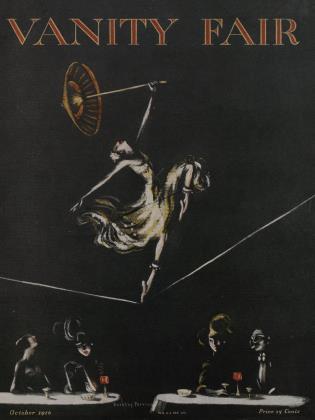Sign In to Your Account
Subscribers have complete access to the archive.
Sign In Not a Subscriber?Join NowSOCIAL JOTTINGS IN BOOK FORM
ROBERT C. BENCHLEY
VANITY FAIR endeavors to keep its readers informed of everything that is new in the arts, letters and in the drama. In every issue there will be found pictures of the latest notable canvases and the newest examples of modem sculpture, as well as brief notices or criticisms of any books of promise. The book which we review this month was recently brought to our attention by a friend who chanced to see a copy at a Lenox house-party. Its title is "The New York Social Register." It is a handy little volume, written wholly in vers libre, and contains much that we think may be of interest to our readers. So far as we know, this book has never before been reviewed from a critical or literary standpoint. All previous references seem to have been made from the statistical side; but statistics are dull things at best, and Vanity Fair has no time to bother with them.
The New York Social Register. Social Register Association, N.Y. 12mo. 846 pages.
LOVERS of light reading will greet with interest this latest product from the pen of the prolific and anonymous author who has for so many seasons hidden behind the modest pen-name of "Social Register Association." This book is one of a long series, and we are given to understand ir. the preface that it is to be followed by a sequel next year.
Such an announcement seems to us a bit premature. Has the public not been satiated with books of this type; stories which often place realism before romanticism, and glorify the minutiae of a hum-drum existence by their detailed notation? Would it not be the better course to wait and see how this book is received by the public before undertaking—as so many authors do (Oliver Optic, Robert W. Chambers, Nick Carter and Anna Katherine Green)—to foist a sequel on the market?
IT is true that the inspiration of Zola and Arnold Bennett come from just such a regard for details, but they had behind them a great moving Idea—the Idea of Life in Detail—which gave to the articles in their upper bureau drawers a reason for being (raison d'etre). But what raison d'etre (reason for being) can the most sensitive readers find in the following touch of realism from page 419 of "The New York Social Register"?
"MACKAY Mr. Clarence H-R. Un.Mt. Ul. Rg. K. B. Ny. Cy. av'd Olym Ct. Tf. T. Mb. Au.Pr. Ao. Wk.S.Ns.Cth.Pcusf. Sep 23"
True to life? Perhaps. But, likewise, irrelevant and forced. How much better if the thing had just been hinted at, and passed over.
IN the introduction to the work, the author gives promise of a keen perception into the workings of human-nature with his assertion that it is very common to find "many intermarriages among families in the various cities and constant changes from one city to another."
How true that is of all of us! Who has not, at some time in his or her life, intermarried among families if he or she has married at all? And as for changing constantly from one city to another—there is a good one going the rounds about a traveling salesman who came into a small town late at night—but that is neither here nor there. What is meant is that in this little touch of quick understanding the author sets a standard which he fails to reach again throughout his book.
As for the plot, it drags. The reader is led from the opening sentence on page l,"AbbeDr. & Mrs. Rob't (Palmer-Catherine Amory) C.Uv. Cd.Cly. '70," to the last sentence of all— "Zurcher Mr. Otto-Un" on page 733, without once feeling that the denouement is going to be a novel one. It is always obvious just where the thing is leading, what the end will be, and conscious of this, the reader loses interest.
WE must, however, express our delight at the various little Gilbertian touches inserted by the author in his lighter moods, which touches, alas, are tantalizingly few. Could anything be more, shall we say alliterative, than the chapter heading "Married Maidens?" Right here the thing should have been turned into a musical comedy libretto and a song inserted, entitled "We're a Million Married Maidens." And, when you add to this the possibilities that lie in the phrase "Dilatory Domiciles," the wonder is that the Social Register Association ever started writing a book at all. Comic opera is much more in its line. If the book has a fault it lies in the reckless way in which the author introduces his characters and then leaves them before us, without at all developing their personal eccentricities, tastes, passions, or even the color of their eyes and hair.
 View Full Issue
View Full Issue












Subscribers have complete access to the archive.
Sign In Not a Subscriber?Join Now